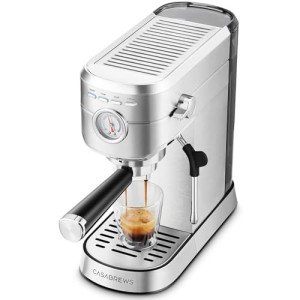The History Of Best Espresso Machines In 10 Milestones
Best Espresso Machines: A Comprehensive Guide
Espresso machines have actually ended up being a staple in coffee culture, bring in lovers and casual drinkers alike. The ideal shot of espresso can elevate the coffee experience, and choosing the ideal machine is vital for achieving this objective. This article explores the world of espresso machines, checking out a few of the very best options offered on the market today. It will cover the kinds of machines, key functions to think about, a contrast table, and frequently asked concerns.
Types of Espresso Machines
Before venturing into particular products, it's important to comprehend the different kinds of espresso machines offered:
Manual Machines: Also known as lever machines, these need the user to by hand manage the pressure and circulation of water. They offer a hands-on experience but demand more skill.
Semi-Automatic Machines: These machines automate the pressure and temperature, while enabling users to control the shot timing. They are perfect for those who desire to take control without needing excessive effort.
Automatic Machines: These devices automate the brewing process totally; users merely pick the size and strength of the shot. Recommended Browsing for novices.
Super-Automatic Machines: This type grinds the beans, tamps, brews, and even froths milk instantly. They're outstanding for convenience, making them appropriate for those who desire speed without sacrificing quality.
Capsule Machines: Utilizing pre-packaged coffee pods, these are the easiest machines for making espresso. While convenient, they often do not have the depth of flavor discovered in freshly ground beans.
Secret Features to Consider
When looking for the very best espresso machine, several essential functions should direct your choice:
Pressure: The perfect pressure for an espresso machine is 9 bars. This pressure is important for extracting tastes efficiently.
Temperature level Control: Consistent water temperature is essential for a great espresso. Search for machines with PID (Proportional Integral Derivative) temperature control.
Develop Quality: Machines made from high-quality products tend to last longer and offer a much better experience.
Size and Footprint: Consider your available counter space. Some machines are compact, while others need substantial space.
Grinder Quality: An integrated grinder provides convenience, however the quality of the grinder affects the final taste. Doser or doserless types change the taste profile considerably.
Ease of Use and Cleaning: Consider how easy the machine is to clean and maintain. Machines with removable parts usually use easier cleaning.
Contrast Table of Best Espresso Machines
Here's a comparison table showcasing some of the most recommended espresso machines based on various user reviews and professional scores:
Espresso Machine
Type
Pressure (Bars)
PID Control
Grinder Type
Cost Range
Breville Barista Express
Semi-Automatic
9
Yes
Cone-shaped burr grinder
₤ 600 – ₤ 700
De'Longhi EC155
Manual
15
No
No grinder
₤ 100 – ₤ 150
Rancilio Silvia
Semi-Automatic
9
No
No grinder
₤ 700 – ₤ 800
Saeco Xelsis
Super-Automatic
15
Yes
Integrated grinder
₤ 1,000 – ₤ 1,500
Nespresso VertuoPlus
Capsule
N/A
No
No grinder
₤ 150 – ₤ 200
Gaggia Classic Pro
Semi-Automatic
9
Yes
No grinder
₤ 400 – ₤ 500
Summary of Best Espresso Machines
- For Beginners: The De'Longhi EC155 is an exceptional beginning point due to its affordable cost and ease of use.
- For Serious Enthusiasts: The Rancilio Silvia uses a balance between quality and control, attracting those who wish to improve their barista abilities.
- For Convenience: The Saeco Xelsis stands apart as a top super-automatic alternative, ideal for users looking for optimum ease without jeopardizing taste.
Frequently Asked Questions (FAQs)
Q1: What is the very best pressure for extracting espresso?A1: The perfect pressure is 9 bars; this pressure level is optimum for drawing out the tastes in espresso.
Q2: How often should I clean my espresso machine?A2: Regular cleansing is necessary. For machines with built-in mills, it is best to clean them after every use. Deep cleaning needs to be done weekly or regular monthly depending on use and model.
Q3: Can I use routine coffee in an espresso machine?A3: Espresso is made from finely ground coffee, preferably roasted particularly for espresso. While you can use routine coffee, the taste and extraction might vary.
Q4: How long can my espresso machine last?A4: With appropriate care and maintenance, a high-quality espresso machine can last several years, even decades.
Q5: What grinder should I use for espresso?A5: A burr grinder is more suitable, as it provides consistent grind size which is essential for proper extraction.
The journey to finding the very best espresso machine can be an exciting one, filled with discovery and capacity for developing one's coffee palate. Whether selecting the simplicity of a capsule machine or the control of a manual model, understanding the various types and functions can greatly boost the experience. With advances in innovation and development, there's an appropriate espresso machine for all choices and skill levels on the market today. Investing in the ideal machine not only guarantees great taste however also elevates the overall coffee experience.
